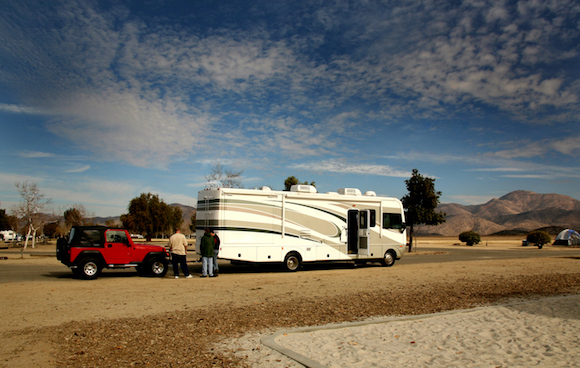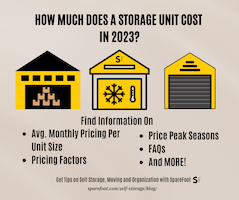Laura Nunemaker and Kevin Miller spent one of their first nights as full-time RVers camped in a Walmart parking lot in Brunswick GA, on Thanksgiving weekend 2016. They’d hit the road in their 2003 Winnebago Adventurer, a 35-foot Class A motorhome, after selling their house and parking the RV for about a month at Stone Mountain Park Campground near Atlanta.
Since the couple hadn’t made campground reservations, they ended up “boondocking,” camping without electric, water or sewer hookups, in the retailer’s parking lot during their drive to the Florida Keys. Nunemaker, 49, and Miller, 41, who work remotely for their jobs, have now lived in their RV for a year and a half and love it. The couple also maintains a blog, VeganRV.com, filled with RV Adventures and vegan recipes.
Nunemaker and Miller exemplify a growing trend, nomads who call an RV home. There are “hundreds of thousands” of full-time RVers in the U.S., says Chuck Woodbury, editor at RV Travel, an RV news and information website.
Different Types of RV Dwellers
“You’ve got people who are close to being homeless and can get an RV for next to nothing, get power and hookups at a campground and live in the RV or camper instead of renting an apartment,” says Woodbury.
Other full-timers travel from place to place working on pipelines, oil fields or construction projects. Then you’ve got the people who just like to see new places.
“A lot of full-timers will roam around and travel the country,” says Woodbury. Some may live in only a couple of places throughout the year. For example, a full-time RVer might hook up at a campground for the summer in Michigan but spend the winter months in Arizona.
Woodbury also operates FulltimeRVer, packed with posts on topics such as how to get started, best types of RVs for full-timing, public lands boondocking and traveling with your dog.
Nunemaker and Miller don’t miss their old home-bound life at all, looking back only when it involves a side mirror and a lane change. Are you thinking about a full-time RV lifestyle? If so, here are 10 things you need to know before selling your house and hooking up to a new lifestyle.
1. Choose the Right Travel Partner.
https://www.instagram.com/p/BeBHLlahDFz/
If you’re living with someone in an RV, that’s a tight space.
“Everybody gets on each other’s nerves at some point,” says Nunemaker, who shares a 200 to 300 square foot space with Miller. “One of my biggest surprises is that we didn’t want to kill each other. We actually get along fine in our space.”
2. Select an RV That Meets Your Needs.
There are all kinds of RVs invarying sizes, which you can research at the Recreational Vehicle Industry Association. Woodbury and Nunemaker both advise buying a used RV, since new RVs come with their own sets of problems and repairs. Nunemaker says she and Miller bought their RV, which had around 12,000 miles on it at the time, from its previous owner.
“It’s better to get one that’s two or three years old, and someone else has worked out all those kinks,” says Nunemaker.
3. You’ll Need to be a Minimalist.
There’s no extra room in an RV, so you have to be okay with a minimalistic lifestyle. “We have a perpetual Goodwill pile, since any time something comes in, you have to think about what’s going out,” says Nunemaker.
4. Roadside Assistance is Worth it.
Nunemaker and Miller have Coach-Net roadside assistance, which paid off when their RV broke down and had to be towed in December 2017 near Tucson, AZ, at a cost of around $1,000.
“The beauty of Coach-Net is we didn’t have to pay for it,” says Nunemaker.
Another popular RV roadside assistance company: Good Sam.
5. Campsites Range From Cheap to Pricey.
https://www.instagram.com/p/BbXRvfdFz8o/
Campsite rental and hookups averages between $500 to $800 per month, depending on the region and type of campground. At some campgrounds, you’ll pay $200 per month but you can also pay up to $1,500 for a month at a resort campground, says Woodbury. Your rent generally pays for a basic 50-amp electric hookup, enough for a large fifth-wheel travel trailer or a Class C motorhome.
6. You Can’t Boondock Just Any Old Place.
Just because Walmart will often let you boondock in the parking lot doesn’t mean that all the stores will. Boondocking at Walmart means a one-night stay too, so don’t expect to camp for two weeks. Allstays offers a camping and RV app that shows which Walmarts have overnight parking resorts, and you can also check out sites like RV Camping for public lands for boondocking by state. You also might need to find a place to stash your RV for the long term if you decide to get off the road for a while.
7. You Can Find Work on the Fly.
While roaming the country, search Workampers, which posts jobs for RVers and campers at RV parks, campgrounds, resorts and RV-based businesses.
8. You’ve Got to Get Mail.
You can pay most of your bills online but you’ll still need a mailbox for other things. Nunemaker and Miller use America’s Mailbox, which does mail receiving and forwarding and gives them a South Dakota address for state-specific needs like taxes and vehicle registration.
“Every so often, we have our mail forwarded to us if we’re going to be somewhere for a week or two,” says Nunemaker.
9. You Might Want to Bring a Car, Too.
When you go from a campsite into town, “You don’t want to drive something that’s 40 or 45 feet long,” says Woodbury.
That’s why most people tow a small car behind their RV or camper. Check out Motorhome Magazine’s guide to RV flat-towing and a list of manufacturer-approved flat-towable vehicles.
10. RV Living Can be Affordable.
Nunemaker says she and Miller’s cost of full-time RV living is “about the same” as when they lived in a house.
Sure, your RV can cost a few thousand in repairs occasionally, but “Things happen in a house too, like the air conditioning or heat going out,” says Nunemaker. “When we have repairs, we just roll with it.”




